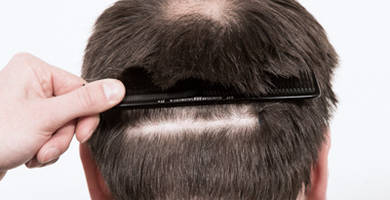What causes autoimmune hair loss? Is there a treatment?
By Prof. Dr. Soner Tatlidede 2020-12-07

Autoimmune hair loss is caused by some type of autoimmune disorder, which occurs when our body's immune system of - which is in charge of defending it from external aggressions by producing antibodies against toxins, viruses, bacteria, etc. - turns against its own cells and attacks them. The causes are not clear, but in addition to genetic factors, there are environmental factors, hormonal factors, stress, etc.
Can an autoimmune disease cause hair loss? Although there are dozens of autoimmune disorders, not every autoimmune disease causes hair loss, and not in the same extent: sometimes hair loss is just temporary and affects only a small area, but others it reaches such a degree that you'll need a FUE hair transplant. Let's talk about which of these diseases cause hair loss, and how can we stop it.
Why autoimmune disorders trigger hair shedding?
As we have just said, there is a relation between autoimmune diseases and hair loss, but not all diseases related to the immune system cause hair to fall out; it is estimated that there are more than 80 disorders related to the immune system, but of these only a few ones cause hair loss: alopecia areata, lupus, psoriasis or Crohn's disease are examples of autoimmune disorders causing hair loss.
In these cases, hair loss occurs when the body's white blood cells (leucocytes) attack follicles cells, damaging them and reducing their ability to generate hair. However, it must be emphasized that in most cases follicle are still alive, so with the proper treatment it is possible to make them generate healthy hair again.
The causes that trigger autoimmune diseases are not well known yet, but it is known that there are risk factors or triggers such as genetics; but by themselves, inherited genes are not the only cause, but they must be activated due to environmental factors, exposure to chemical agents, infections, stress situations, etc. There is also a certain predisposition depending on race, and even gender.
What autoimmune diseases can cause hair loss?
What autoimmune diseases cause hair loss? Among the autoimmune diseases that can lead to some form of hair loss are alopecia areata, lupus, psoriasis, Chrohn's disease and Hashimoto's disease. Alopecia areata is one of the autoimmune diseases that cause hair loss more frequently; it's caused when hair follicles are attacked and thus their ability to produce hair becomes reduced. It can affect head but also face and other parts of the body, generating small spots (areas) without hair that can grow further with time.
Lupus is another chronic autoimmune disease characterized by periods of activation and remission, in which the body rejects hair causing it to fall out, although it will later grow back during remission periods. For its part, Hashimoto's disease occurs when the immune system attacks thyroid gland, causing a series of disorders in the body that can include changes in hair texture or hair loss in large amounts, even in the long term.
Psoriasis is also an immune system disorder whose exact causes are unknown, and which is quite widespread among population. It affects different areas of the skin causing redness, itchiness and the appearance of scales. Normally it does not cause major hair loss, unless it affects scalp.
Crohn's disease is also a very common autoimmune system pathology that causes a chronic inflammation of intestine; although hair loss is not a common symptom of this disease, it can occur because the absorption process in the intestine of nutrients and elements necessary for hair growth becomes limited.
How do you treat autoimmune hair loss?
Alopecia treatment in autoimmune diseases is not an easy task, it can be quite difficult depending on the disease and its severity. However, there are several methods and treatments to stimulate hair growth, including following a varied diet rich in proteins and trace elements (necessary for hair growth), taking supplements such as biotin, or using natural and nutritious shampoos.
Using topical products such as minoxidil can also help to stop hair loss; Platelet Rich Plasma (PRP) is another recommended autoimmune hair loss treatment. However, all these efforts are hampered not just by the autoimmune disease itself, but because the medication used to combat the disorder usually has hair loss as a side effect, as occurs with immunosuppressants.
On many occasions, the only solution left for autoimmune hair loss is - once the disease and its hair loss have stabilised - resorting to a hair transplant to mitigate the aesthetic consequences for the patient. Clinicana is the best hair transplant clinic in Turkey, with innovative treatments and highly qualified staff. Ask us for a free consultation with no obligations. Get your hair back now!


.jpg)






